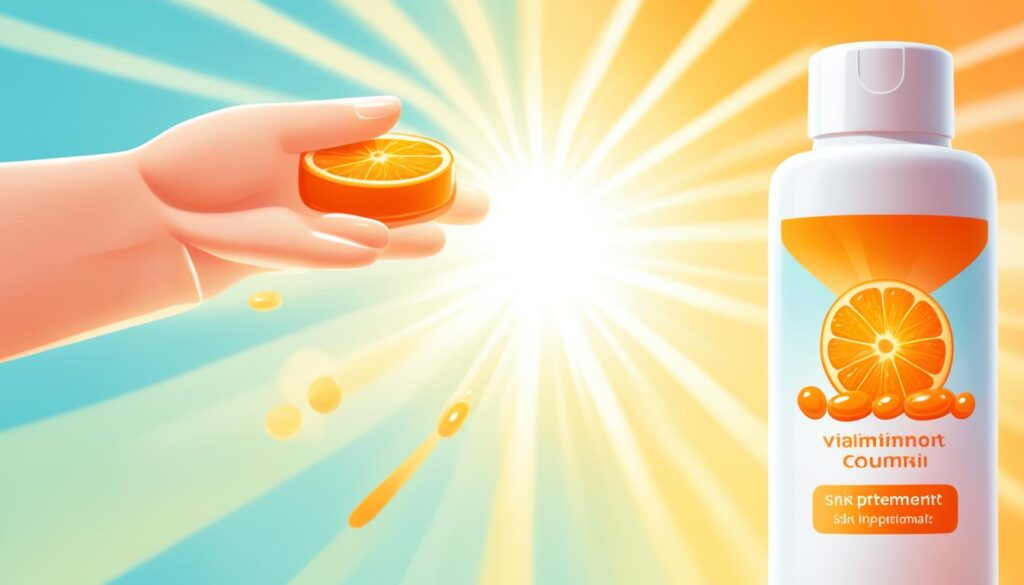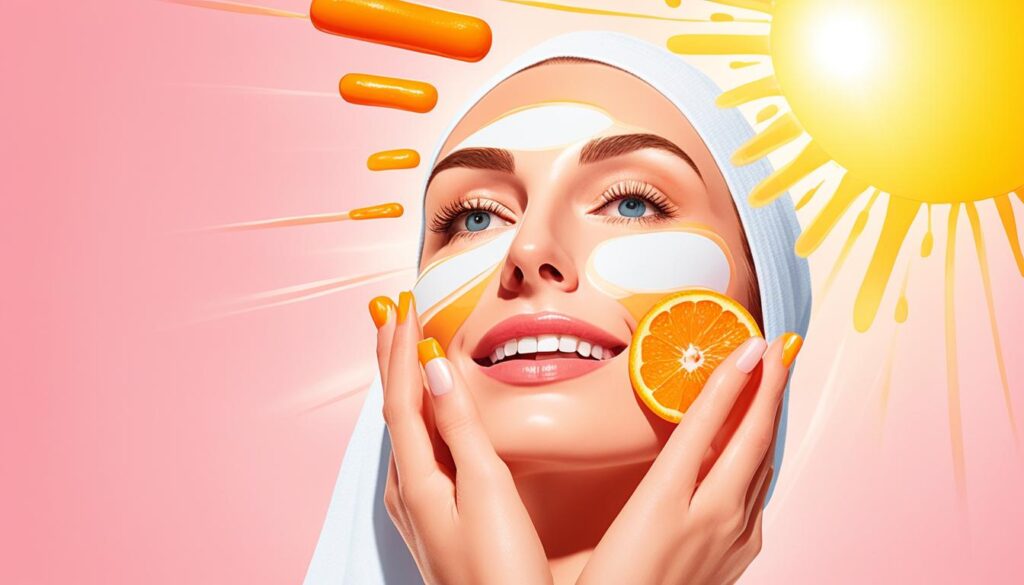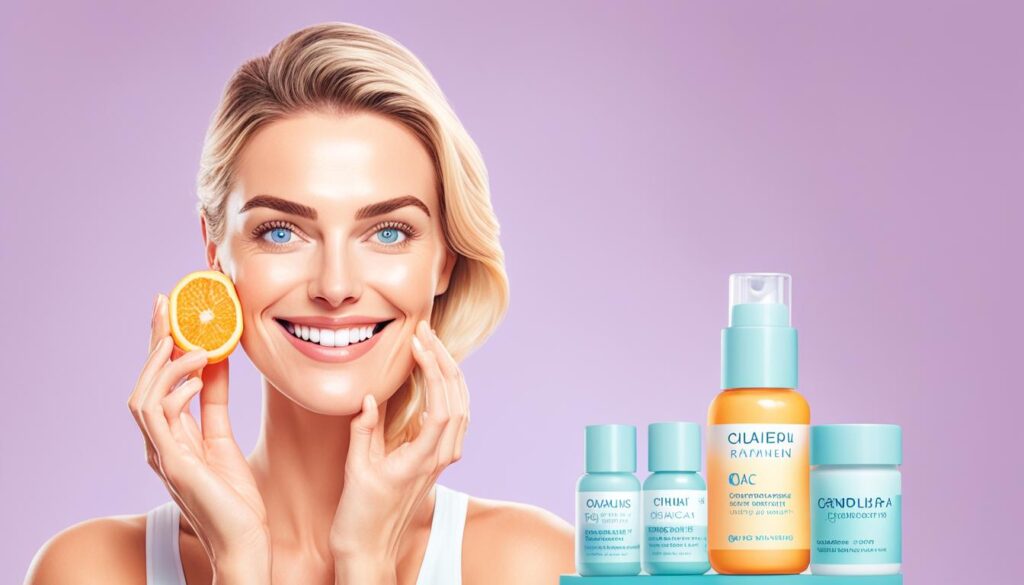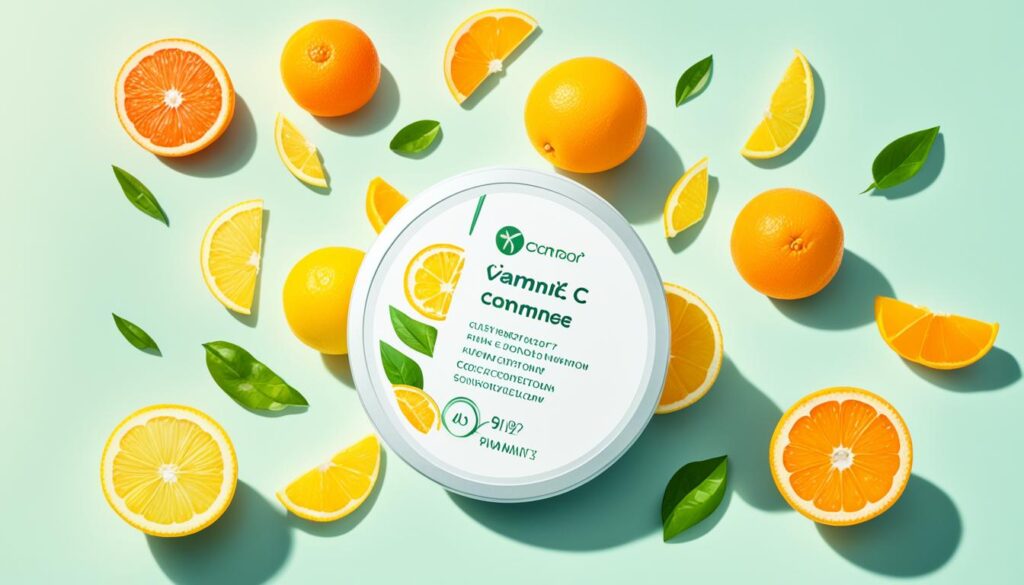Vitamin C works wonders for making your skin look healthy and glowing. This antioxidant fights off bad stuff in your skin. It helps repair your skin, makes it look better, and creates collagen. Yet, your skin might not get enough of it because of getting older, pollution, and too much sun.
Table of Contents
ToggleIt’s not just about eating vitamin C for your skin. Putting it right on your skin can do even more. Vitamin C tablets make your skin look young and bright. They help with lots of skin problems, like looking tired or having spots.
Adding vitamin C pills to your day can really help your skin. They boost collagen, make wrinkles less visible, lighten dark spots, and calm down redness. Vitamin C makes your skin shine with health.
Introduction to Vitamin C and Its Skin Benefits
Vitamin C is a special nutrient that helps your skin look and feel good. It acts as a strong fighter against damage, keeping your skin young and fresh.
Vitamin C: A Legendary Nutrient for Glowing Skin
Our skin naturally has vitamin C deep within it. But, this starts to lessen as we get older, or when we’re around pollution and sun. Adding vitamin C to your skincare helps put this nutrient back in place. This brings out your skin’s best glow.
The Importance of Vitamin C in Skin Health
Vitamin C does a lot for our skin. It fights off bad stuff, helps fix tissues, and makes more collagen. These all make your skin stronger and younger. A study found that vitamin C is key for healing and making collagen.
Other studies found that vitamin C works best when we use it regularly. It’s important to keep up good levels of vitamin C for your skin to be at its best.
Want to make your skin shine or learn how vitamin C helps? Using vitamin C every day can really make a difference. Your skin will look fresh, young, and make you feel good.
Boosting Collagen Production for Youthful, Firm Skin
Vitamin C is key for making collagen, which keeps skin firm and young. Without it, our skin loses its bounce and starts to show lines. This is why using vitamin C for collagen helps make skin look younger and feel firmer.
Research says vitamin C boosts collagen in a few cool ways. When you put it on your skin as ascorbic acid, it gets in there and works well. Your skincare usually has 10% to 20% vitamin C, which is just right for better collagen.
A study showed that mixing tyrosine, zinc, and vitamin C for anti-aging made vitamin C work even better. This team effort makes your skin look and feel younger.
Adding vitamin C for collagen to your daily skin routine really works. It helps fight signs of aging like wrinkles and drooping. So, you end up with glowing, younger-looking skin.

Fading Hyperpigmentation and Achieving an Even Skin Tone
Vitamin C does wonders for your skin. It can fade dark spots and make your skin tone even. This is because it fights against an enzyme called tyrosinase, which makes melanin. Melanin is what makes our skin color uneven. But, vitamin C stops this enzyme from making too much melanin. So, your skin looks clearer and brighter.
Vitamin C’s Role in Reducing Dark Spots and Acne Scars
Vitamin C also boosts collagen. Collagen is a protein that makes our skin strong and smooth. When our skin has more collagen, it can heal faster. This helps with acne scars and other dark marks. Your skin gets a chance to repair, becoming softer and less bumpy.
How Vitamin C Helps in Treating Gingival Melanin Hyperpigmentation
People have looked into using vitamin C for dark gums. This problem is called gingival melanin hyperpigmentation. Some studies say that putting vitamin C directly on the gums can lighten this dark color. It’s a step towards having a brighter smile.
By using vitamin C in your daily skincare, you can fight against dark spots and dull skin. It stops the overproduction of melanin, boosts collagen, and calms the skin. All of this helps to make your skin tone more even and glowing.

Reducing Inflammation and Redness for a Clear Complexion
Vitamin C helps your skin a lot by lowering redness and swelling. This strong antioxidant is amazing for a shiny, clear face. It fights off free radicals and boosts your skin’s defenses. That’s why vitamin C is great for stopping acne, psoriasis, and redness problems.
Adding vitamin C to your skincare fights redness well. Research shows it cuts down acne and makes skin look better. How does it work? Vitamin C helps control your immune system. So, it lowers redness and stops breakouts by calming down inflammation.
- Vitamin C’s antioxidant powers fight off free radicals that make skin red and swell.
- Putting vitamin C right on your skin can cut acne by 61% in only 12 weeks.
- Using vitamin C with things like retinol makes it even better at fighting redness, giving you clearer skin.

Vitamin C is also key for healing wounds and new skin growth. It boosts collagen making, fading acne marks and dark spots. This leaves your skin looking more even and brighter. If you have ongoing skin issues or sometimes break out, using vitamin C can really help get a smooth, clear face.
Protecting Against Sun Damage and Accelerating Wound Healing
Vitamin C is great for your skin. It fights off UV rays and pollution. It can’t replace sunscreen, but it helps a lot.
Vitamin C’s Antioxidant Properties for UV Protection
Vitamin C stops UV light from hurting your skin. It fights free radicals and lowers stress on your skin. This protects your skin’s DNA and stops sun damage.
Putting vitamin C on your skin works better than just eating it. It works even better with vitamin E. Together, they guard your skin well.
The Role of Vitamin C in Enhancing Wound Healing
Vitamin C is key in healing wounds. It helps make collagen and new skin cells. This makes wounds heal faster.
It’s great to use vitamin C every day. This protects your skin and helps it heal. So, use a serum, cream, or take a supplement to keep your skin glowing.

Vitamin C for Brighter Under-Eye Area and Reducing Dark Circles
Vitamin C is well known for making skin brighter and fighting signs of aging on the face. It also does wonders for the under-eye area. This antioxidant can lessen dark circles, puffiness, and fine lines. You’ll look more youthful and radiant.
Vitamin C helps with under-eye circles by increasing collagen. Collagen keeps our skin elastic and firm. But as we get older, we make less collagen. This leads to wrinkles and sagging. Vitamin C boosts collagen-making, helping to fill out the under-eye area. This lowers dark circles and fine lines.
Vitamin C is also great at reducing puffiness and inflammation. The skin under our eyes is very sensitive to things like UV rays and pollution. These can make dark circles and bags worse. Vitamin C fights these bad things, making the skin calmer. This gives a brighter, more even look.
The exact link between vitamin C and under-eye discoloration is not clear. But, it is still a great choice for brighter, less puffy skin. Adding an under-eye gel with vitamin C to your routine can make you look more youthful and glowing.

Vitamin c tablets for skin
Vitamin C tablets can make your skin healthy and glowing. But, picking the right one can be tricky. Knowing how to choose and use these supplements is key.
Choosing the Best Vitamin C Supplement for Skin Health
Not all vitamin C tablets are good for your skin. The best ones have ascorbic acid, which is easy for your body to use. Aim for a 10-20% concentration. Avoid types like calcium ascorbate since they might not work as well.
Look for vitamin C tablets that also have vitamin E, ferulic acid, or hyaluronic acid. Adding these ingredients can make the vitamin C even more powerful for your skin.
Recommended Vitamin C Dosage for Skin
The right amount of vitamin C depends on what you need. For most adults, 75-200 mg a day is good. But, if you want to fix skin spots or heal faster, you could take up to 500 mg daily.
Start with a small dose and work your way up. High amounts of vitamin C might upset your stomach. Before you start, talk to your doctor if you’re on meds or have health issues.

Pick a good vitamin C supplement and use it the right way. This will help your skin look better and younger. Don’t forget to fit vitamin C into your daily skincare. Enjoy the benefits!
Combining Vitamin C with Other Skincare Ingredients
Mixing vitamin C with other good ingredients can do wonders for your skin. This powerful antioxidant, when paired well, can do a lot. It can make your skin look younger, help stop dark spots, and more.
Enhancing Vitamin C’s Effects with Vitamin E and Other Antioxidants
Vitamin C and E work great together. They shield your skin from harm even better when combined. The Linus Pauling Institute found that they help stop sun damage best.
Adding vitamin C to your routine with other goodies like ferulic acid boosts its effects. For example, a mix of vitamin C, ferulic acid, and phloretin guards your skin from the sun’s harm. This was seen in a 2008 study.
Using these vitamins with sunscreen improves your protection. This is what researchers say.
But, be careful with combos. Some mixes might make your skin red or dry. Get advice from a skin doctor to pick what’s best for you.
Knowing how to use your skincare products is key. Use the thinnest first, then the thickest. There are special rules for using things like vitamin C and sunscreen or hyaluronic acid with retinol.
Dietary Sources of Vitamin C for Healthy Skin
Topical vitamin C products can boost your skin directly. But, eating foods high in vitamin C can also help your skin. Common foods high in vitamin C are citrus fruits, peppers, and broccoli. They keep your skin glowing and firm, and protect it from harm.
Here are some great sources of vitamin C for your skin:
- Kakadu plum has up to 2,907 mg of vitamin C per 100 g. That’s 484% of your Daily Value (DV).
- Acerola cherries give 825 mg of vitamin C in just 1/2 cup. This is 916% of the DV.
- Rose hips contain 426 mg of vitamin C per 100 g, equaling 473% of the DV.
- Green chili peppers have 242 mg of vitamin C per 100 g. One pepper gives 121% of the DV.
- Guavas offer 228 mg of vitamin C per 100 g. One guava meets 138% of the DV.
Vitamin C is also found in yellow peppers, black currants, and kale. Adding these foods to your diet can make your skin healthier and brighter.
Precautions and Possible Side Effects of Vitamin C Supplements
Vitamin C is good for you but be careful with side effects and precautions. Some people might get slight skin problems with over 20% doses. Make sure it doesn’t affect your drugs because it can change how some medications work.
Monitoring for Potential Interactions with Medications
Be careful with vitamin C if you take other medicines. Mixing it with paracetamol may not be good. Always talk to a doctor before adding vitamin C to your daily pills, especially if you take other drugs.
Vitamin C can change how some medicines are used or help your body break them down. If on blood thinners, chemo drugs, or hormones, watch for differences in how well they work when you start vitamin C.
Also, watch out for these issues:
- Increased risk of kidney stones when combined with certain diuretics
- Reduced effectiveness of antidepressants like monoamine oxidase inhibitors (MAOIs)
- Interference with the body’s ability to metabolize estrogen-based contraceptives
Always work with your doctor to use vitamin C safely. This is even more important if you’re sick or on other meds.
Remember, most people do well with vitamin C. But, be watchful for side effects and drug interactions. It’s smart to talk to a doctor before starting it. This advice is extra important if you’re already sick or on meds.
Conclusion
Vitamin C is amazing for your skin. It makes your skin glow and look young. You can use it in creams or eat foods that have it.
Adding vitamin C to your skincare helps a lot. It can make your skin even and bright. You will find many products with vitamin C.
But talk to a doctor before taking too much. With care, vitamin C will do wonders for your skin.
FAQ
What are the skin benefits of vitamin C?
Vitamin C helps your skin by fighting off bad things called free radicals. It fixes your skin, makes collagen, and fades spots. It also helps against redness and sun harm.
How does vitamin C promote collagen production?
Vitamin C helps the collagen in your skin stay strong. This makes your skin look smoother and stops it from sagging. It’s like a happiness vitamin for your skin!
Can vitamin C help fade dark spots and even out skin tone?
Yes, indeed! Vitamin C works well in making dark spots and blemishes less noticeable. It does this by stopping melanin, the thing that makes spots, from forming.
How can vitamin C help reduce skin inflammation and redness?
Vitamin C fights off bad stuff that can make your skin red and puffy. It helps your skin stay calm and fresh by being a superhero against those irritants.
Does vitamin C provide protection against sun damage?
Yes, vitamin C is like a shield against the sun’s bad effects. It fights off free radicals caused by the sun. It’s not sunscreen, but it does help your skin stay healthier.
Can vitamin C benefit the under-eye area?
Vitamin C makes the skin under your eyes better by plumping it up. It also helps with dark circles and makes your eyes look more awake. So, it’s a great friend for your under-eye area.
What is the best way to incorporate vitamin C into a skincare routine?
The best way is to use vitamin C serums and creams. You can also take vitamin C supplements to help your whole body, including your skin.
Can vitamin C be combined with other skincare ingredients?
Yes, vitamin C works better when teamed up with other good skincare stuff. Things like vitamin E and certain plant extracts make it work even harder. They do more to protect your skin together.
What are some dietary sources of vitamin C for healthy skin?
Healthy foods like citrus fruits, peppers, and broccoli are full of vitamin C. Including these foods in your meals helps your skin get enough of this important vitamin.
Are there any precautions or side effects to be aware of when taking vitamin C supplements?
Most people tolerate vitamin C very well. But, too much of it might make some skin types a bit irritated. Also, watch out for how it might mix with any medicines you are taking.
Source Links

This article is medically reviewed by Dr. Chandril Chugh, Board-Certified Neurologist, providing expert insights and reliable health information.
Dr. Chandril Chugh is a U.S.-trained neurologist with over a decade of experience. Known for his compassionate care, he specializes in treating neurological conditions such as migraines, epilepsy, and Parkinson’s disease. Dr. Chugh is highly regarded for his patient-centered approach and dedication to providing personalized care.








